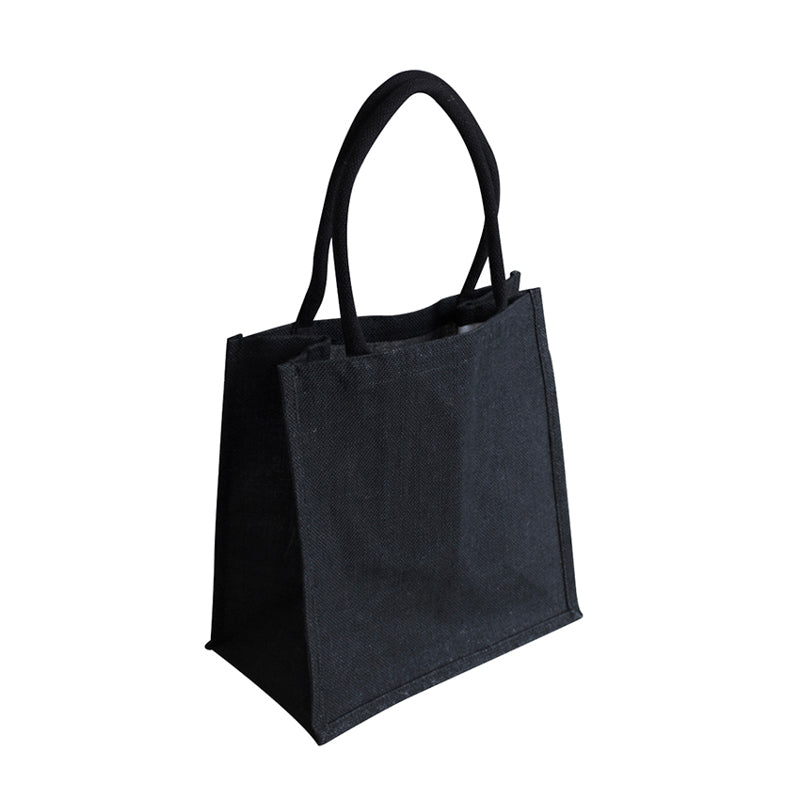
Ecobags Black Jute Reusable Grocery Bag
This strong jute shopper features a generous gusset, enabling it to stand up by itself, making it a great choice for groceries and everyday shopping.
Size: 320mm(w) x 340mm(h) x 200mm(gusset)
Minimum order quantity for custom branding: 100
There is no minimum order for unbranded bags.






- Product Specs
- FAQs
- Branding Options
Jute is a strong, natural fibre that is 100% biodegradable. These bags are the perfect option for robust, earthy-looking printed merchandise or everyday shopping.
These bags are laminated with a very thin film of plastic, which is heat-sealed to the inside, enabling them to hold their shape and providing protection from spills. The laminate enables you to wipe the bag's inside clean and will prolong its life (unlaminated versions are in natural colour on special orders of 500).
Size: 320mm(w) x 340mm(h) x 200mm(gusset)
Minimum order quantity for custom branding is 100 bags. Click on 'request a quote' above, or contact us, for custom branding. As with any natural fibres, we may have slight variance in weight, weave and base colour for each batch.
Bulk buy starts with quantity of 25. Enjoy free shipping on orders value $150 and onwards. Prices are inclusive of GST
What is jute made from?
Jute is a plant, which is commonly used for its fibre to make burlap, hessian, and gunny cloth. Jute is a long, soft, shiny vegetable fibre that is spun into course, thick threads. It forms a very natural, strong fabric.
How do you ensure your jute is ethically sourced?
All of our bags are manufactured in SEDEX certified factories. Because jute is widely farmed in the developing world, certification helps us ensure that our supply chain adheres to ethical social and employment conditions.
Are these bags biodegradable?
Yes, our jute bags are made from natural fibres and will eventually biodegrade. Because they're thicker and more robust, they will take longer to do so than cotton. Please note whether your bag features a thin plastic film as lining - if so, that will not degrade with the rest of the bag.
How sustainable is jute?
Compared to other fibres/fabrics jute uses a lot less water to produce. It doesn't require any pesticides or fertilisers to grow well and replenishes very quickly. Like bamboo, jute absorbs carbon dioxide and releases oxygen faster than trees. And jute is even said to enhance the fertility of the soil it grows in for future crops. So, jute is very sustainable.
Please note however that some jute bags include a thin plastic lining, which enables them to be wiped clean, hold their shape and last a lot longer. Plastic is not a sustainable material but we take care to use as little of it as possible.
Can I custom print jute bags? What's the minimum order quantity?
Minimum order for local printing is 100 bags and turnaround time is typically 3 weeks. Minimum order for offshore printing is 500 bags and turnaround is typically 10 - 14 weeks depending on specifications and transit options selected (sea or air freight).
Please note that, since jute is such a coarse fabric, bold and simple designs will print better.
For more information see the Branding Options tab.
Submitting artwork
Submit your logo or design to contact@ecobags.co.nz (or attach it in the ‘request a quote’ form) on any product page. Any format will be accepted for the purpose of a quote.
For production, we prefer vector artwork in .EPS or .PDF format. We can also work with AI or.PSD which can be edited. Please ensure all text is outlined. If you need a little graphic design support, to get your artwork up to scratch, we can help at nominal charge.
Design a fully customised bag
If you’re after your own bespoke style, unique colour, size, material and branding, please email us (contact @ecobags.co.nz) with a description of what you wish to achieve. Lead times are typically 10-14 weeks depending on the product specifications and transit time (sea or air freight). We can sometimes provide branded bags in as little as 30-days with express air freight but this will incur a greater cost.
Branding Methods
Screen-printing – best for simple designs with a few block colours. It is the most economical way to brand your bags. Please note that screen printing is not ideal for logos with colour gradients, half tones or fine details. It can be difficult to achieve fine detail in screen printing on rough textures like canvas or jute.
Digital print/heat transfer – great for artwork with multiple colours and fine details. It is commonly used to brand textile surfaces and bags using heat pressed onto the product to produce a permanent bond. Please note that only approximate colour matches are possible. This method is slightly more expensive than screen printing but produces great results for complex graphics or colour gradients.
Direct to garment (DTG) – this process uses specially modified inkjet technology to achieve full-colour graphics. It’s a great solution for low-quantity orders with complex, finely detailed designs. Please note that colours may be slightly muted depending on the base fabric.
Embroidery – great for achieving a hand-stitched aesthetic. Most artwork files can be digitised so the embroidery machine can recreate your artwork onto your bag.

